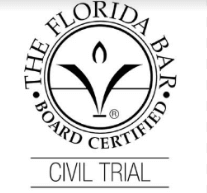Table of Contents
When a patient is injured as a result of a healthcare provider’s negligence, they have a limited amount of time to take legal action. The “statute of limitations” determines how long you have to file a claim. It’s important to be aware of this deadline, because once it has passed, injured parties cannot recover damages for a serious medical mistake.
In Florida, patients typically have two years from the time they become aware that medical negligence could be responsible for their injury to take legal action against the responsible parties. There are qualifications and even exceptions to this rule, so always discuss your case with an experienced attorney to determine what legal options are available to you.
Florida medical malpractice attorneys with Kogan & DiSalvo want you to know about recent changes in state law that may impact your right to sue for medical negligence.
What Are Statutes of Limitations and Why Are They Important?
A statute of limitations is a law that imposes a certain time restraint on a plaintiff’s right to sue an at-fault party. Although you can technically file a medical malpractice lawsuit after the statute of limitations, your chance of a good outcome will be drastically reduced.
Generally, if you file a claim after this deadline has passed, the defendant’s medical malpractice attorney will bring this to the judge’s attention and your claim is likely to be dismissed. If that occurs, you lose the right to sue and recover financial compensation.
Statutes of limitations exist to ensure legal proceedings move along in a timely manner. They also protect would-be defendants from unjust legal action. If it has been a long time since the original event, it becomes more challenging to retrieve valuable evidence and connect with witnesses who may or may not remember something that happened several years ago.
Are There Exceptions to the Medical Malpractice Statute of Limitations?

While there are some exceptions to the medical malpractice statute of limitations in Florida, they are fairly limited.
Generally, the statute of limitations can be extended for the following circumstances:
- Claims involving minors: Claims brought on behalf of a minor can be filed on or before the child turns eight.
- Claims involving fraud, concealment, or misrepresentation: If the claim involves fraud or deception, the plaintiff has an additional two years from the date of discovery to file a claim.
Keep in mind, statutes of limitations can be nuanced. Do not assume that it’s too late to sue. Schedule a free consultation with Kogan & DiSalvo Florida medical malpractice attorneys to discuss your own situation.
What Is the Florida Statute of Repose?
Some health problems are caused by dangerous or defective medical devices or medications. In Florida, victims harmed by these products can file a product liability claim for damages. These claims are bound by the Statute of Response, which bars lawsuits after 10-12 years have passed.
Always check with your Florida personal injury lawyer to determine which deadlines apply to your case.
What Is the Discovery Rule?
Discovery is a key element in Florida medical malpractice claims. The state’s discovery rule says that the clock on filing a claim starts ticking when the victim becomes aware of or notices an injury that was caused by a negligent act—not the date of the act itself.
This distinction is highly relevant in medical malpractice cases where the injured patient may not develop or notice signs of a problem until well after the initial treatment or procedure. In this case, they have two years from the time they learn there is a problem, or the time they should reasonably have been aware of a problem.
Establishing the Date of Discovery

The best way to establish a date of discovery for your case is to be as diligent as possible when documenting your medical care. Keep all of your medical records for everything from routine check-ups to minor and major procedures.
Seek medical care for your complications and report any unusual symptoms to your healthcare provider. If you suspect a medical error occurred, contact a Florida medical malpractice lawyer right away.
Remember, your time to take legal action is limited. If malpractice occurred, you need to protect your right to sue by acting swiftly.
Does Percentage of Fault Matter in Malpractice Cases?
Generally, no. Florida recently shifted from pure comparative fault to modified comparative fault. This means if a judge or jury determines the plaintiff is at least more than 50 percent at fault for the event that caused their injuries, they cannot recover compensation for their losses. If they are found to be 49 percent or less responsible, their recovery is reduced proportionally by their percentage of fault.
In malpractice claims, plaintiffs are less likely to be at fault for a medical error as long as they followed the guidance of their healthcare provider and consented to the appropriate treatment for their condition.
Fault plays a bigger part in situations like car accidents and work injuries where the plaintiff may have acted somewhat carelessly in a way that partially contributed to their injuries.
Our Medical Malpractice Lawyers Fight for Clients Impacted by Life-Changing Injuries

Do you still have questions about how long you have to sue for medical malpractice based on your unique circumstances? We can help. We know how traumatic it can be to develop complications from the medical treatment that was supposed to help you.
That is why every Kogan & DiSalvo attorney and staff member is committed to achieving justice for clients who have experienced physical, emotional, and financial challenges after a serious injury. Call or connect online to schedule a free case review in any of our South Florida locations.








